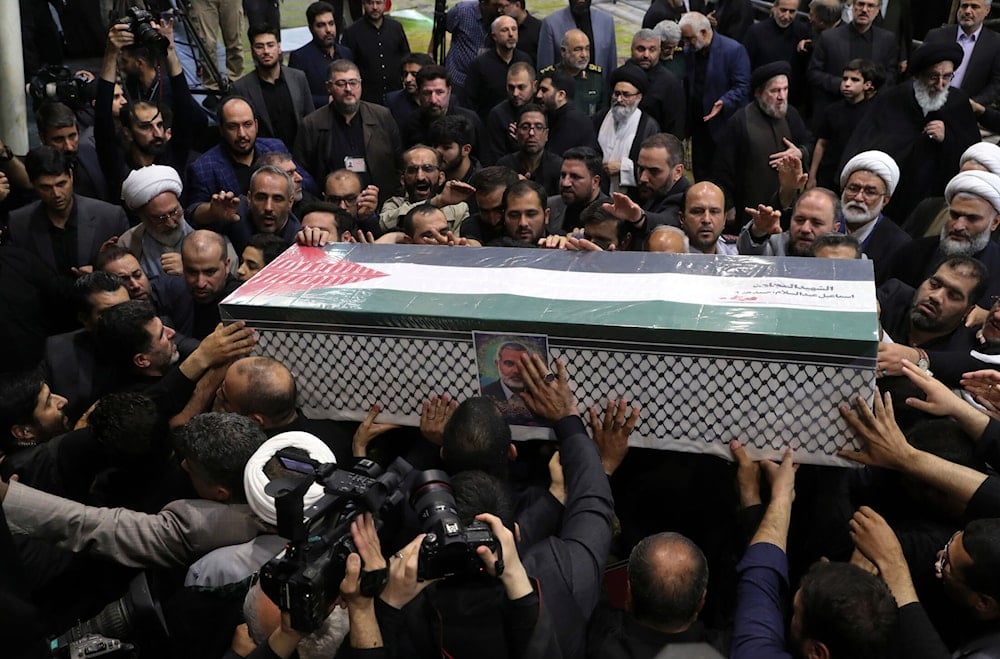Scores to settle, destructive war results of Israeli assassinations
The stakes are monumental for US President Joe Biden, who has pledged to spend his final months in office to bring the captives home and put an end to the war on Gaza.
-

In this photo, people carry the coffin of Hamas leader Ismail Haniyeh at the Tehran University campus, in Tehran, Iran, August 1, 2024. (Office of the Iranian Supreme Leader/AP)
More than at any other time since October 7, "Israel's" assassination in Iran and Lebanon have inched the Middle East closer to an all-out war in the region, Axios reported.
Even outside of Gaza, where expectations for a ceasefire and captives agreement are fading after months of meticulous negotiations, the cycle of escalation might draw the United States further into the unfolding regional crisis and result in widespread tragedy.
The stakes are monumental for US President Joe Biden, who has pledged to spend his final months in office to bring the captives home and put an end to the war.
Read next: Iran's retaliation to differ from consulate retaliation: Israeli media
Unlike the previous Iranian retaliation in April, which targeted southern occupied Palestine and specifically the Negev Airbase, Israeli occupation sources indicate that the upcoming retaliatory attack might focus on bases in central regions.
The Axis of Resistance, which has been carrying out military operations against "Israel" and the US since last October to force an end to the genocide in Gaza, vowed to avenge its leaders and the Israeli aggressions on their countries.
American authorities worry that the Axis of Resistance in the area, spearheaded by Iran, is keen to settle a number of unresolved scores produced by the events of the past few days.
In Iran, the Biden administration believes the Islamic Republic of Iran would strike "Israel" in a few days in retaliation for Ismail Haniyeh, the chief of Hamas' Political Bureau, who was killed in Tehran earlier this week.
In Lebanon, in a speech delivered yesterday at a large funeral ceremony held for Hezbollah's martyred leader Sayyed Fouad Shokor, Hezbollah's chief Sayyed Hassan Nasrallah said the recent Israeli crimes have led to the confrontation with the Resistance Axis to enter a new phase.
Asserting that retaliation is "inevitable", he said, "We are facing a major battle where matters have surpassed the issue of support fronts," referring to operations conducted by the Palestinian Resistance's allies in support of Gaza.
"We are in an open battle on all fronts, and it has entered a new phase .. and the escalation of the new phase depends on the Israeli reactions," Sayyed Nasrallah warned.
As for Yemen, Ansar Allah's leader, Sayyed Abdul-Malik al-Houthi pledged a "military response" Thursday in response to "Israel's" assassination of Haniyeh.
Iraq, in the meantime, has vowed to respond to the US aggression on a PMF base in southern Iraq.
The possibility of a four-front war has left Biden and his senior advisors extremely irritated with the current situation.
Just an escalation?
The United States believes that Iran will carry out its retaliation against "Israel" for assassinating Haniyeh, Axios reported on Thursday, citing three US officials, adding that the US is "preparing to counter it."
According to the news site, the officials said Iran's attack is expected to be larger but similar in nature to that back in April, which came in response to the Israeli attack on the Islamic Republic's consulate in Syria, and could also involve Hezbollah.
According to the outlet, Biden's administration fears that this time around it may be more difficult to form a security coalition to protect the Israeli regime.
Read next: Coinciding with Haniyeh's funeral in Doha, Hamas calls for day of rage
According to a new report by the Financial Times, US and EU diplomats are urgently discussing the Middle East crisis to prevent a full-blown regional war after "Israel" targeted Hezbollah and Hamas leaders in Beirut and Tehran respectively.
In turn, influential US Congress leaders have voiced concerns about the impact of Hamas political bureau chief Ismail Haniyeh's assassination on Palestine's Gaza Strip ceasefire negotiations, as reported by Politico.
According to Politico, the chairman of the Senate Armed Services Committee, Jack Reed, suggested that the assassination was a deliberate act by Netanyahu to derail the negotiation process, cautioning that it "signals an escalation in tensions."

 4 Min Read
4 Min Read








